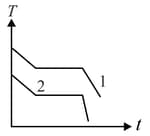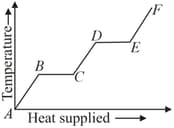Specific Heat Capacity
Specific Heat Capacity: Overview
This topic covers concepts, such as, Heat Capacity, Specific Heat Capacity, Molar Specific Heat Capacity, Heat Capacity of Solids, Specific Heat Capacity of Water & Variation of Specific Heat Capacity of Water with Temperature etc.
Important Questions on Specific Heat Capacity
The molar heat capacity of water at constant pressure is . When 1kJ of heat is supplied to 100g of water, which is free to expand, the increase in temperature of water is
A metal cube absorbs of heat when its temperature is raised by . If the specific heat of the metal is , then the mass of the cube is
During an adiabatic process, the pressure of a gas is found to be proportional to the cube of its absolute temperature. The ratio for the gas is . Find .
Two different liquids of same mass are kept in two identical vessel, which are placed in a freezer that extracts heat from them at the same rate causing each liquid to transform into a solid. The schematic figure below shows the temperaure vs time plot for the two materials. We denote the specific heat in the liquid states to be and for materials and respectively, and latent heats of fusion and respectively.

Choose the correct option.
200 g water is heated from to . Ignoring the slight expansion of water, the change in its internal energy is close to (Given specific heat of water J/kg/K):
A current carrying wire heats a metal rod. The wire provides a constant power to the rod. The metal rod is enclosed in an insulated container. It is observed that the temperature in the metal rod changes with time as:
where is a constant with appropriate dimension while is a constant with dimension of temperature. The heat capacity of the metal is:
A person weighing takes in diet per day. If this energy were to be used in heating the body of person without any losses, then the rise in his temperature is (specific heat of human body )
Amongst object A and B, if the specific heat of object A is less than of object B, then
A cube of lead of at is supplied with a heat. Find the final temperature (in degree Celsius) of the lead cube. (Take, specific heat of lead is )
Calculate the heat energy (in joules) to raise the temperature of of water from to . (Take specific heat of water, )
The amount of heat required to raise the temperature of mass of water through is called its
Specific heat of a substance is given by , find out amount of heat required to raise the temperature of substance from to
How much heat energy (in ) is necessary to raise the temperature of of water from to ?
The number of degrees of freedom of a gas whose specific heat capacity at constant pressure is is
(universal gas constant )
A copper wire long is stretched by . If the energy stored in the stretched wire is converted to heat, calculate the rise in temperature of the wire. (Given: , Density of copper and Specific heat of copper
ice at is mixed with steam at . The minimum value of so that finally all ice and steam converts into water is,
(Use, , (melting) and (vaporization).)
Which statement is false for specific heat of water?
During illness an man ran a fever of instead of normal body temperature of Assuming that the human body is mostly water, how much heat is required to raise his temperature by that amount?
A source of heat supplies heat at a constant rate to a solid cube. The slope of portion of the graphs gives :-

For next 2 question please follow the same
Molar heat capacity of an ideal gas in the process constant is given by
An ideal diatomic gas with occupies a volume V1 at a pressure P1 . The gas undergoes a process in which the pressure is proportional to the volume. At the end of the process the rms speed of the gas molecules has doubled from its initial value.
The molar heat capacity of the gas in the given process is
